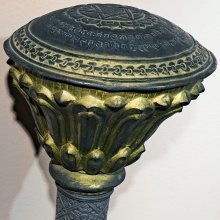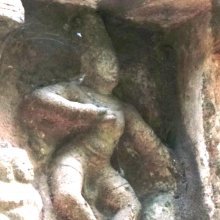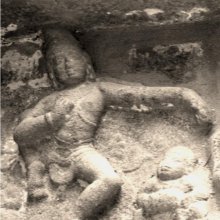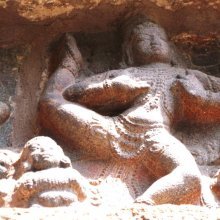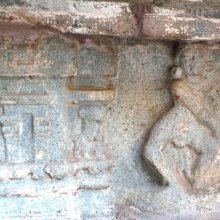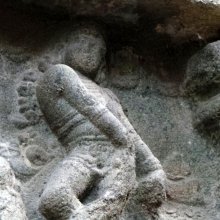Tola, Tōlā: 17 definitions
Introduction:
Tola means something in Hinduism, Sanskrit, the history of ancient India, Marathi, Hindi, biology, Tamil. If you want to know the exact meaning, history, etymology or English translation of this term then check out the descriptions on this page. Add your comment or reference to a book if you want to contribute to this summary article.
Alternative spellings of this word include Tol.
Images (photo gallery)
(+10 more images available)
In Hinduism
Yoga (school of philosophy)
Source: Wisdom Library: YogaTola (तोल) is a Sanskrit word referring to “poising one’s self”. It is used in Yoga.

Yoga is originally considered a branch of Hindu philosophy (astika), but both ancient and modern Yoga combine the physical, mental and spiritual. Yoga teaches various physical techniques also known as āsanas (postures), used for various purposes (eg., meditation, contemplation, relaxation).
Ayurveda (science of life)
Rasashastra (Alchemy and Herbo-Mineral preparations)
Source: archive.org: Rasa-Jala-Nidhi: Or Ocean of indian chemistry and alchemyTola (तोल) or Karṣa refers to unit of measurement. Tola is equal to 180 grains. (see the Rasajalanidhi by Bhudeb Mookerji volume 3)

Āyurveda (आयुर्वेद, ayurveda) is a branch of Indian science dealing with medicine, herbalism, taxology, anatomy, surgery, alchemy and related topics. Traditional practice of Āyurveda in ancient India dates back to at least the first millenium BC. Literature is commonly written in Sanskrit using various poetic metres.
Purana and Itihasa (epic history)
Source: archive.org: Puranic EncyclopediaTola (तोल).—A great satirical poet of the Malayālam Literature. A great humorist, Sanskrit scholar and actor, he was minister to Bhāskara Ravi Varmā who was ruler of Kerala during the period from 978 to 1027 A.D. According to Koduṅgallur Kuñjikkuttan Tampurān, a great Sanskrit scholar and poet, Tola was born in Kondoliññāru in the village of Airāṇikkulam near Aḍūr in Cochin in a Nambūdiri family. His original name was Nīlakaṇṭha. When he was a young man, he was ostracised from his community for having had illicit connections with a low-caste servant-maid named Cakkī. He was wearing then a deerskin belt (Tol) on his body as the usual mark of Brahmacārins (bachelors) and he threw it away of his own accord earning for him the name Tola. There is another version that Tola is the decayed form of 'Atula' meaning matchless. He was mainly interested in writing funny ridicules. There are many such poems now available believed to be those of Tola.

The Purana (पुराण, purāṇas) refers to Sanskrit literature preserving ancient India’s vast cultural history, including historical legends, religious ceremonies, various arts and sciences. The eighteen mahapuranas total over 400,000 shlokas (metrical couplets) and date to at least several centuries BCE.
India history and geography
Source: Cologne Digital Sanskrit Dictionaries: Indian Epigraphical GlossaryTola or Tolā.—cf. Telugu-Kannaḍa tulā (CITD), weight of a rupee, taken as the unit of the system of weights; fixed at 180 grains troy by the British; also called suvarṇa (JNSI, Vol. XVI, p. 46). Note: tola is defined in the “Indian epigraphical glossary” as it can be found on ancient inscriptions commonly written in Sanskrit, Prakrit or Dravidian languages.
--- OR ---
Tola.—also spelt tolaka; 80 ratis in weight; same as suvarṇa. Note: tola is defined in the “Indian epigraphical glossary” as it can be found on ancient inscriptions commonly written in Sanskrit, Prakrit or Dravidian languages.

The history of India traces the identification of countries, villages, towns and other regions of India, as well as mythology, zoology, royal dynasties, rulers, tribes, local festivities and traditions and regional languages. Ancient India enjoyed religious freedom and encourages the path of Dharma, a concept common to Buddhism, Hinduism, and Jainism.
Biology (plants and animals)
Source: Google Books: CRC World Dictionary (Regional names)1) Tola in Central African Republic is the name of a plant defined with Entada abyssinica in various botanical sources. This page contains potential references in Ayurveda, modern medicine, and other folk traditions or local practices It has the synonym Acacia polyacantha subsp. campylacantha (Hochst. ex A. Rich.) Brenan (among others).
2) Tola in English is also identified with Gossweilerodendron balsamiferum It has the synonym Prioria balsaminfera (Vermoesen) Breteler (etc.).
3) Tola in Kenya is also identified with Commiphora africana It has the synonym Balsamodendrum africanum (A. Rich.) Arn. (etc.).
4) Tola in Mexico is also identified with Heteropogon contortus It has the synonym Andropogon glaber (Pers.) Raspail, nom. illeg., non Andropogon glaber Roxb. (etc.).
Example references for further research on medicinal uses or toxicity (see latin names for full list):
· Flore de France, ed. 3 (1805)
· Wageningen Agricultural University Papers (1999)
· New Phytologist (1873)
· Species Plantarum.
· African Study Monographs (1998)
· Grasses of Burma (1960)
If you are looking for specific details regarding Tola, for example side effects, health benefits, extract dosage, pregnancy safety, diet and recipes, chemical composition, have a look at these references.

This sections includes definitions from the five kingdoms of living things: Animals, Plants, Fungi, Protists and Monera. It will include both the official binomial nomenclature (scientific names usually in Latin) as well as regional spellings and variants.
Languages of India and abroad
Marathi-English dictionary
Source: DDSA: The Molesworth Marathi and English Dictionaryṭōlā (टोला).—m ( H) A stroke with a stick or bat: also a blow with a stone or brickbat. 2 A brickbat. 3 fig. A cutting, stinging, probing speech. v (in the three senses) dē, māra.
--- OR ---
ṭōḷa (टोळ).—m A locust. 2 A grasshopper.
--- OR ---
tōla (तोल).—m (tula S) Weighing. 2 Weight, quantity measured by the balance. 3 n A mass by which, as the standard, bodies are determined, a weight. 4 m Inclination, leaning, bent or bearing towards, lit. fig. Pr. jasā vārā vājēla tasā tōla dyāvā. 5 Quantity thrown in (in weighing out certain substances) over and above the due or just quantity. 6 Equiponderance or parity of weight; matchedness gen. 7 fig. Influence, importance, power, consequence. tōla dēṇēṃ To bear or put up with; to forbear (offences &c.): also to yield or give way to; to acquiesce in (occurrences &c.) tōla lāvūna cālaṇēṃ To strut or stalk. tōla sambhāḷaṇēṃ To maintain equipoise or equilibrium, to balance. tōlāsa tōla ghēṇēṃ To vie or cope with; to emulate; to compete; to give weight for weight.
--- OR ---
tōḷā (तोळा).—m (tōla S) A weight of gold or silver. It is stated in books at 16 māṣa of 5 ratī or 6 1/2 grains each; amounting therefore to 105 grains Troy: in practice it is calculated at 12 māṣa jeweler's weight; amounting therefore to 210 grains. tōḷāmāsā expresses Variableness or fickleness; as hā or hyācī prakṛti or rōgācī bhāvanā tō0 āhē: and tōḷāmāsā pāhaṇēṃ (To regard drachms and scruples.) To be penurious.
Source: DDSA: The Aryabhusan school dictionary, Marathi-Englishṭōlā (टोला).—m A stroke with a stick or bat. A brick-bat. A cutting, stinging, prob- ing speech.
--- OR ---
ṭōḷa (टोळ).—m A locust. A grass-hopper.
--- OR ---
ṭōḷā (टोळा).—f A band, body, troop, company.
--- OR ---
tōla (तोल).—m Weighing. Weight, quantity measured by the balance. Inclination. leaning, bearing or bent towards. Fig. Influence. tōla dēṇēṃ Bear or put up with; forbear (offences &c.), also yield, give way to. tōla sambhāḷaṇēṃ Maintain equi- librium, balance. tōlāsa tōla dēṇēṃ Vie or cope with, emulate, compete.
--- OR ---
tōḷā (तोळा).—m A weight of gold or silver. tōḷā- māsā expresses variableness or fickle- ness. Ex. hyācī prakṛtī tōḷāmāsā āhē. tōṃḷāmāsā pahāṇēṃ To be penurious.
Marathi is an Indo-European language having over 70 million native speakers people in (predominantly) Maharashtra India. Marathi, like many other Indo-Aryan languages, evolved from early forms of Prakrit, which itself is a subset of Sanskrit, one of the most ancient languages of the world.
Sanskrit dictionary
Source: DDSA: The practical Sanskrit-English dictionaryTola (तोल).—[tul-karmaṇi ac]
1) Weight or quantity measured by the balance.
2) A weight of gold or silver equal to 12 māṣas or a tolā.
Derivable forms: tolaḥ (तोलः), tolam (तोलम्).
--- OR ---
Tola (तोल).—&c. See under तुल् (tul).
See also (synonyms): tolana.
Source: Cologne Digital Sanskrit Dictionaries: Shabda-Sagara Sanskrit-English DictionaryTola (तोल).—mn.
(-laḥ-laṃ) A Tola, a weight of gold or silver; it is stated in books at 16 Mashas of 5 Rettis or 6(1/2) grains each, and weighs therefore 105 grains troy; in practice it is calculated at 12 Mashas jeweller’s weight, and weighs nearly double, or 210 grains; but actually it is of the same weight as the Sicca or grs. 179(2/3.) E. tul to weigh, affix karmaṇi ac; also with ṇvul affix tolaka mn. (-kaḥ-kaṃ.)
Source: Cologne Digital Sanskrit Dictionaries: Monier-Williams Sanskrit-English Dictionary1) Tola (तोल):—mfn. (√tul) ‘poising one’s self’ See ghana-
2) m. n. = laka, [Horace H. Wilson]
3) Tolā (तोला):—[from tola] f. ‘weighing (?)’ [Vopadeva]
Source: Cologne Digital Sanskrit Dictionaries: Yates Sanskrit-English DictionaryTola (तोल):—[(laḥ-laṃ)] 1. m. n. A tola or weight, passing for 210 grains.
Source: DDSA: Paia-sadda-mahannavo; a comprehensive Prakrit Hindi dictionary (S)Tola (तोल) in the Sanskrit language is related to the Prakrit word: Tula.
[Sanskrit to German]
Sanskrit, also spelled संस्कृतम् (saṃskṛtam), is an ancient language of India commonly seen as the grandmother of the Indo-European language family (even English!). Closely allied with Prakrit and Pali, Sanskrit is more exhaustive in both grammar and terms and has the most extensive collection of literature in the world, greatly surpassing its sister-languages Greek and Latin.
Hindi dictionary
Source: DDSA: A practical Hindi-English dictionary1) Ṭola (टोल) [Also spelled tol]:—(nm) a band, batch; group; —[banānā] to form a group.
2) Ṭolā (टोला):—(nm) a quarter/zone of a town or village.
3) Tola (तोल):—(nf) weight; -[māpa] weights and measures.
4) Tolā (तोला):—(nm) an Indian unit of weight—one eightieth of a seer.
...
Kannada-English dictionary
Source: Alar: Kannada-English corpusTola (ತೊಲ):—[noun] = ತೊಲೆ [tole]3.
--- OR ---
Tōla (ತೋಲ):—
1) [noun] amount a thing weighs; heaviness or mass; weight.
2) [noun] an ancient unit of weight used in weighing precious materials as gold, silver, etc.
3) [noun] a state of equilibrium or equipoise; equal distribution of weight, amount, etc.; the state of bodily equilibrium or stability.
4) [noun] mental steadiness or emotional stability; habit of calm behaviour, judgment, etc.
5) [noun] the aesthetically pleasing harmony of various elements in a design, sculpture, painting, etc.; harmonious proportion or integration.
--- OR ---
Tōḷa (ತೋಳ):—
1) [noun] any of various wild canine carnivores including Canis lupus (genus Canis); a wolf.
2) [noun] (fig.) a person eager or having a tendency, to devour large quantities of food; a voracious person. ತೋಳ ಹಳ್ಳಕ್ಕೆ ಬಿದ್ದರೆ ಆಳಿಗೊಂದು ಕಲ್ಲು [tola hallakke biddare aligomdu kallu] tōḷa haḷḷakke biddareāḷigondu kallu (prov.) all the world will beat the man whom fortune buffets.
--- OR ---
Tōḷa (ತೋಳ):—[noun] a friend of the bridegroom in a marriage.
Kannada is a Dravidian language (as opposed to the Indo-European language family) mainly spoken in the southwestern region of India.
Tamil dictionary
Source: DDSA: University of Madras: Tamil LexiconTōlā (தோலா) noun < Urdu tōlā < tulā. Weight of a rupee, 180 grs.; ஒருரூபா எடை. [orurupa edai.]
--- OR ---
Tōḷā (தோளா) noun < dōlā. Litter. See டோலி. [doli.] (W.)
Tamil is an ancient language of India from the Dravidian family spoken by roughly 250 million people mainly in southern India and Sri Lanka.
See also (Relevant definitions)
Starts with (+64): Tol-atiparavi, Tola wood, Tola-molitevar, Tolabandi, Tolabhairava, Tolaca, Tolace, Tolaci, Toladara, Toladari, Tolage, Tolagike, Tolagisu, Tolagu, Tolaha, Tolai, Tolaivettu, Tolaivillimankalam, Tolaivu, Tolaka.
Ends with (+45): Aattola, Aitola, Alatola, Alma tola, Angatola, Apostola, Asamatola, Atola, Ayatola, Balatola, Baza-kantola, Bhotola, Bitola, Chekitola, Citola, Gatola, Ghanatola, Gharatola, Ghatola, Golamatola.
Full-text (+130): Dola, Tula, Caturdola, Ashtamika, Ghanatola, Dola-yatra, Drankshana, Panitala, Dolayana, Karshahva, Samdola, Tolu, Pancamritaparpati, Rupay, Vijayaparpati, Tolam, Thola, Dhola chitaaparu, Dhola ankul, Dhola anko.
Relevant text
Search found 50 books and stories containing Tola, Dhola, Dola, Thaolaa, Thola, Tholaa, Ṭōlā, Ṭolā, Ṭōḷa, Ṭola, Tōla, Tōḷā, Tolā, Ṭōḷā, Tōḷa, Tōlā; (plurals include: Tolas, Dholas, Dolas, Thaolaas, Tholas, Tholaas, Ṭōlās, Ṭolās, Ṭōḷas, Ṭolas, Tōlas, Tōḷās, Tolās, Ṭōḷās, Tōḷas, Tōlās). You can also click to the full overview containing English textual excerpts. Below are direct links for the most relevant articles:
Rasa Jala Nidhi, vol 5: Treatment of various afflictions (by Bhudeb Mookerjee)
Chapter 13 - Symptoms and treatment of Pandu (anemia) and Kamala (jaundice)
Chapter 8 - Symptoms and treatment of Amlapitta (acidity and biliousness)
Chapter 26 - Symptoms and treatment of Amavata (gout and rheumatism)
Rasa Jala Nidhi, vol 4: Iatrochemistry (by Bhudeb Mookerjee)
Part 83 - Vijaya-parpati < [Chapter III - Jvaratisara fever with diarrhoea]
Part 5 - Treatment for enlargement of spleen and liver (4): Pliha-sudana rasa < [Chapter VII - Enlargement of spleen (plihodara) and liver (yakridudara)]
Part 11 - Treatment for enlargement of spleen and liver (10): Lokaraja rasa < [Chapter VII - Enlargement of spleen (plihodara) and liver (yakridudara)]
Charaka Samhita (English translation) (by Shree Gulabkunverba Ayurvedic Society)
Chapter 11 - The therapeutics of Pectoral Lesions (kshata-kshina-cikitsa) < [Cikitsasthana (Cikitsa Sthana) — Section on Therapeutics]
Chapter 16 - The therapeutics of Anemia (panduroga-cikitsa) < [Cikitsasthana (Cikitsa Sthana) — Section on Therapeutics]
Chapter 7 - The Pharmaceutics of Turpeth (trivrit-kalpa) < [Kalpasthana (Kalpa Sthana) — Section on Pharmaceutics]
Rasa Jala Nidhi, vol 1: Initiation, Mercury and Laboratory (by Bhudeb Mookerjee)
Part 2 - Measures of weight < [Chapter VII - Enumeration of technical terms]
Part 1 - Additional process for transformation of base metals into gold and silver < [Chapter VIII - Conclusion of first volume]
Part 10 - Mercurial operations (8): Stimulation of Mercury (dipana) < [Chapter IV-V - Mercurial operations]
Rasa Jala Nidhi, vol 3: Metals, Gems and other substances (by Bhudeb Mookerjee)
Part 3 - Extraction of the best essence of earthworms < [Chapter XII - Gold essence of Earthworms]
Part 19 - Purification of Leeches < [Chapter XXXI - Upavisha (semi-poisons)]
Part 1 - Semi-poison (1): Snuhi < [Chapter XXXI - Upavisha (semi-poisons)]
Shukra Niti by Shukracharya (by Benoy Kumar Sarkar)
Related products
